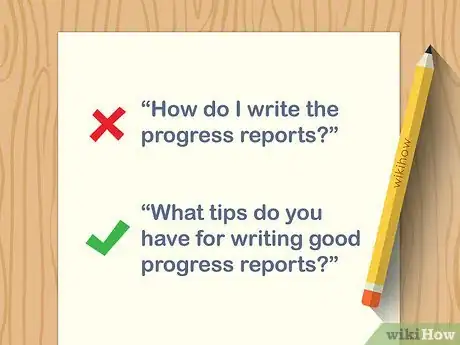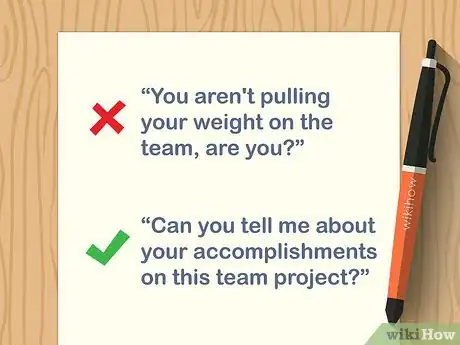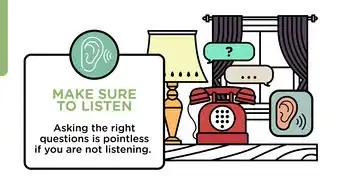This article was co-authored by Patrick Muñoz. Patrick is an internationally recognized Voice & Speech Coach, focusing on public speaking, vocal power, accent and dialects, accent reduction, voiceover, acting and speech therapy. He has worked with clients such as Penelope Cruz, Eva Longoria, and Roselyn Sanchez. He was voted LA's Favorite Voice and Dialect Coach by BACKSTAGE, is the voice and speech coach for Disney and Turner Classic Movies, and is a member of Voice and Speech Trainers Association.
There are 7 references cited in this article, which can be found at the bottom of the page.
This article has been viewed 14,703 times.
Asking questions is a great way to know someone better or learn more about a specific topic. But the key to asking questions effectively is knowing why, how, and when to phrase them. Depending on the situation, you can use question-asking techniques to get more out of each inquiry, ask efficient questions in the workplace, or improve your social skills. Then, next time you need to ask something, you'll be that much closer to asking clearer questions.
Steps
Asking Clear Information-Driven Questions
-
1Focus your question on a specific topic. Before you ask the question, consider what information you want to know or are missing. Shape your question around the missing information to make sure the answer covers your concern.[1]
- If you want to know when to expect a pizza delivery, for example, ask, "When can I expect the pizza to be delivered?" instead of, "Can you deliver the pizza tonight?"
-
2Avoid asking rhetorical questions. Rhetorical questions are generally more figures of speech that convey an emotion than methods for gaining information. To make sure you ask productive questions and learn new information, try to avoid rhetorical questions like:[2]
- "Is there anyone who understands you?"
- "Are you serious?"
- "Do you want to be in high school for the rest of your life?"
- "What's the matter with those guys?"
- "Why is she so annoying?"
- "Is this some kind of joke?"
Advertisement -
3Talk as little as possible after asking your question. The purpose of asking a question is to clarify a topic you don't yet understand. While receiving the answer to your question, avoid talking or interrupting to make sure the answerer addresses your concerns.[3]
- Keep in mind that since you already know what you understand, listening carefully to the answerer will better help you gain information instead of talking.
-
4Ask follow-up questions to clarify information. After you've received an answer to your question, consider whether you have lingering concerns or missing information. Shape your follow-up questions around the areas that you're still confused about to receive more helpful information.[4]
- If you asked where your school's dance will be held this year but don't know the address of the location you were told, for example, ask, "What's the address for that?"
Asking Questions in the Workplace
-
1Ask your coworkers or supervisors about things you don't understand. Sometimes, employees shy away from asking questions at work to make themselves seem more competent. Keep in mind that asking questions is a great way to improve your working technique and ask questions whenever you need clarification.[5]
- If you're not sure how to format a document, for example, ask your supervisor, "Can you walk me through formatting this document?"
- If you don't feel comfortable asking questions at work, talk to your supervisor. They may be able to foster a positive and more open work environment in future situations.
-
2Construct your questions in ways that foster positive relationships. Questions can be a useful way to connect with your coworkers. Instead of phrasing questions in a critical way, build your questions around learning from and showing your positive regard for them.[6]
- Instead of saying, "How do I write the progress reports?" for example, ask, "What tips do you have for writing good progress reports?"
-
3Ask questions that frame a topic in a new light when leading discussions. The best business questions are those that encourage your employees to think critically and answer your question with their own perspectives. Try to ask questions that encourage your coworkers to reflect and critically analyze the situation.[7]
- You could ask, for example, "What teamwork strategies should we implement into our country's workforce to understand each other better?"
-
4Avoid asking leading questions as a supervisor. Leading questions are ones that have an expected answer and leave little room for explanation, and they are especially common in business situations. While questions should focus on a specific topic, try not to ask questions that have a specific answer in mind.[8]
- Instead of, "You aren't pulling your weight on the team, are you?" for example, ask, "Can you tell me about your accomplishments on this team project?"
-
5Frame your questions around helping employees find a solution. In business situations, questions asked should be focused around completing a task or resolving an issue. Before asking your question, determine what situation you want to resolve and frame your question around it.[9]
- You could, for example, ask, "How can we improve our marketing numbers over the next five years?"
Asking Better Conversational Questions
-
1Relate your question to a specific detail. If you're not sure what question to ask someone, try focusing it on a detail or observation you both have in common. That way, the other person will feel more connected with you and give more focus to their answer.
- You could say, for example, "I love those shoes! Where did you get them?"
-
2Try to ask open-ended questions. When getting to know someone, avoid asking questions that can be answered with just "yes" or "no." Instead, frame your questions in a way that requires at least a sentence of explanation from the other person.[10]
- Instead of, "Is that your dog?," for example, ask, "What's your dog's name and how'd you choose it?"
-
3Avoid interrupting your conversational partner. You'll learn the most about them if you listen carefully and respectfully to them. After asking a question, don't interrupt the person answering your question while they're talking.[11]
- If you have thoughts about the answer your conversational partner gives you, wait until they're done talking to give your opinion.
-
4Share as much information as you ask. In informal situations, asking too many questions without talking about yourself can make conversations seem more like interrogations. Space out every question you ask with information about yourself or a subject you know about to help your conversational partner feel more comfortable.
- If you find yourself asking too many questions, try to share something about yourself or another topic instead of asking another question.
Expert Q&A
-
QuestionHow do you start a conversation with someone?
 Patrick MuñozPatrick is an internationally recognized Voice & Speech Coach, focusing on public speaking, vocal power, accent and dialects, accent reduction, voiceover, acting and speech therapy. He has worked with clients such as Penelope Cruz, Eva Longoria, and Roselyn Sanchez. He was voted LA's Favorite Voice and Dialect Coach by BACKSTAGE, is the voice and speech coach for Disney and Turner Classic Movies, and is a member of Voice and Speech Trainers Association.
Patrick MuñozPatrick is an internationally recognized Voice & Speech Coach, focusing on public speaking, vocal power, accent and dialects, accent reduction, voiceover, acting and speech therapy. He has worked with clients such as Penelope Cruz, Eva Longoria, and Roselyn Sanchez. He was voted LA's Favorite Voice and Dialect Coach by BACKSTAGE, is the voice and speech coach for Disney and Turner Classic Movies, and is a member of Voice and Speech Trainers Association.
Speech Coach If you want to strike up a conversation, try giving them a compliment. Most people like to talk about themselves, or at least to have a connection with other people. Try saying something like, "I love your hair, is it naturally wavy like that or do you do something with it?"
If you want to strike up a conversation, try giving them a compliment. Most people like to talk about themselves, or at least to have a connection with other people. Try saying something like, "I love your hair, is it naturally wavy like that or do you do something with it?"
References
- ↑ https://globaldigitalcitizen.org/ask-good-questions-infographic
- ↑ https://www.entrepreneur.com/article/254264
- ↑ https://www.inc.com/jeff-haden/5-ways-to-ask-the-perfect-question.html
- ↑ https://hbr.org/2009/05/real-leaders-ask.html
- ↑ https://www.forbes.com/sites/michaellindenmayer/2013/06/18/ask-great-question-leadership-skills-of-socrates/
- ↑ https://hbr.org/2009/05/real-leaders-ask.html
- ↑ https://hbr.org/2009/05/real-leaders-ask.html
- ↑ https://www.inc.com/jeff-haden/5-ways-to-ask-the-perfect-question.html
- ↑ https://hbr.org/2009/05/real-leaders-ask.html
About This Article
When you’re trying to learn something, it’s important to ask the right questions. For example, if you’re trying to learn more about a specific topic, think about exactly what you need to know, then frame your question around that information. Once you’ve asked your question, avoid talking or interrupting to be sure you get the answer you need. If you still need clarity, ask follow-up questions until you’re sure you understand. For tips on asking better questions in the workplace, read on!








































































